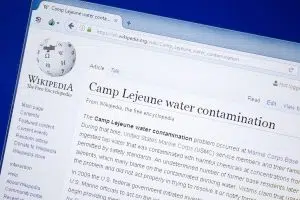In 1982, toxic chemicals were found in the drinking water supplying U.S. Marine Corps Base Camp Lejeune in North Carolina.
Between 1953 and 1987, nearly one million Marines (and their families) stationed at Camp Lejeune were exposed to volatile organic compounds (VOCs) by drinking, bathing, cooking or using contaminated water. Thousands of marines and their families suffered tragic health effects and were routinely denied the chance to file lawsuits seeking fair compensation.
As of June 16, 2022, the House and the Senate passed the Camp Lejeune Justice Act to help compensate veterans and their families. The President has already advocated for its passage and is expected to sign the bill into law.
Once the law passes, Veterans and their families can finally move forward with a claim seeking the compensation they deserve. This new law would allow them to recover damages from exposure to contaminated water at Camp Lejeune between August 1, 1953 and December 31, 1987.

If you or a loved one were at Camp Lejeune for at least 30 days between the dates listed above, you may be eligible to file a claim. Contact The Rothenberg Law Firm Accident and Injury Lawyers for a free consultation to discuss your legal rights and learn how filing a Camp Lejeune water contamination claim can help you and your family.
What is Camp Lejeune?
Who discovered the water contamination at Camp Lejeune?
What caused Camp Lejeune water contamination?
What toxic substances were found in the water at Camp Lejeune?
What are volatile organic compounds (VOCs) and how do they affect our health?
What health effects are associated with exposure to contaminated drinking water at Camp Lejeune?
Medical conditions linked to Camp Lejeune water contamination
Over 15 health conditions are linked to Camp Lejeune water contamination. Some of these medical conditions include:
- Aplastic anemia and other myelodysplastic syndromes
- Bladder cancer
- Kidney cancer and Renal toxicity
- Liver cancer
- Multiple myeloma
- Non-Hodgkin’s lymphoma
- Parkinson’s disease
- Breast cancer
- Esophageal cancer
- Female infertility
- Hepatic steatosis
- Leukemia
- Lung cancer
- Miscarriage
- Neurobehavioral effects
- Scleroderma
There are on-going ATSDR health studies about Camp Lejeune.
The U.S. Department of Veterans Affairs has also announced a list of 8 presumptive conditions linked to water contamination at Camp Lejeune. Service members can receive disability benefits. You must file a disability claim with the VA to qualify.
Camp Lejeune Justice Act
In March 2022, Congress voted to pass the Honoring Our PACT Act of 2022. The Camp Lejeune Justice Act is included with other legal matters related to toxic exposures accompanying military service. On June 16, 2022, the Senate passed the bill by a vote of 84 to 14.
The Camp Lejeune Justice Act establishes a critical two-year window from the date of the law’s enactment. During that time, those exposed to toxic water at the military base may commence legal action.
This bill removes legal technicalities like North Carolina’s statute of repose. Now service members with a history of exposure and relevant medical records will no longer be stopped from filing claims.
The Camp Lejeune Justice Act would allow individuals to file a claim in the U.S. District Court for the Eastern District of North Carolina and recover damages for harm from exposure to contaminated water at the Camp Lejeune Marine Corps Base between August 1, 1953 and December 31, 1987.
The bill also prohibits the U.S. Government from asserting specific immunity from litigation in response to such a lawsuit. Once the law passes, Veterans and their families can finally move forward with a claim to get the compensation they deserve.
The Rothenberg Law Firm - Camp Lejeune Water Contamination Lawyers
The personal injury lawyers at The Rothenberg Law Firm are currently accepting Camp Lejeune cases. Individuals affected by water contamination at Camp Lejeune exist all across the US.
Not all personal injury lawyers are adept at taking on toxic substance exposure claims. The complex nature of these claims requires nuance and years of experience.
The attorneys at The Rothenberg Law Firm Accident and Injury Lawyers have decades of experience handling toxic substance exposure claims. We go the distance for our clients when liable parties do not offer full and fair compensation for the damages they caused.
We offer a free case evaluation for Camp Lejeune water contamination victims. This gives you a chance to discuss what happened to you and your family members with a skilled attorney. You need answers and are entitled to know your available legal options at no cost. There is no obligation to pursue a case if you choose not to and we do not take any fees unless and until we are successful in obtaining money for you.
Call us at 1-800-624-8888, or fill out a free contact form today.






